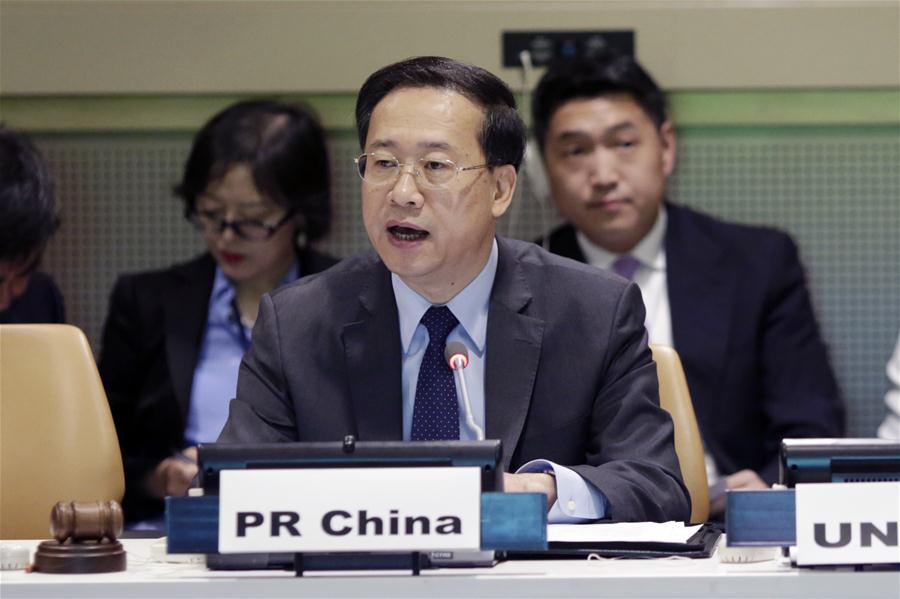
Ma Zhaoxu, China's permanent representative to the United Nations, speaks during a high-level symposium on the Chinese Belt and Road Initiative and the UN 2030 Agenda for Sustainable Development at the UN Headquarters in New York June 13, 2018. The Belt and Road Initiative was proposed by China, but the opportunities and fruits it presents belong to the whole world, said Ma Zhaoxu on Wednesday. (Xinhua/Li Muzi)
UNITED NATIONS, June 13 (Xinhua) -- Chinese Ambassador to the United Nations Ma Zhaoxu said Wednesday that the Belt and Road Initiative (BRI) is China's initiative, but the opportunities and fruits that it presents belong to the whole world.
At a high-level symposium, which was jointly sponsored by the Chinese mission to the United Nations, UN Department of Economic and Social Affairs, World Health Organization and United Nations Development Programme, the Chinese envoy said BRI aims to synergize the development strategies of various countries, strengthen international cooperation for shared prosperity in Asia, Europe and beyond, and jointly build a community of shared future for mankind.
In the fall of 2013, Chinese President Xi Jinping proposed jointly building the Silk Road Economic Belt and the 21st Century Maritime Silk Road. The initiative is guided by the principle of extensive consultation, joint development and shared benefits.
The Belt and Road Initiative has five priorities: policy connectivity, infrastructure connectivity, trade connectivity, financial connectivity, and people-to-people connectivity, Ma explained.
The 2030 Agenda for Sustainable Development adopted at the UN Summit on Sustainable Development 2015 set out 17 sustainable development goals and 169 targets, charting the course for international development cooperation. The purpose of the agenda is to realize common development and prosperity for all through a stronger global partnership, he said.
The BRI and the 2030 Agenda resonate with and reinforce each other, Ma said, adding that together, they promote the cause of international cooperation for development.
Anchored in the purposes and principles of the UN Charter, both are committed to multilateralism and international peace and development, Ma said.
The BRI follows an approach of extensive consultation, joint development and shared benefits, and advocates openness and inclusiveness. The 2030 Agenda underscores international cooperation for development. Both are aimed at economic development and better lives for the people.
Being supportive of countries' own choices of development paths in accordance with their national conditions, both the BRI and 2030 Agenda reflect the desire for a new type of international relations featuring win-win cooperation, he said.
Over the past five years, the initiative has received positive response from the international community. More than 80 countries and international organizations have signed over 100 cooperation documents with China and a large number of cooperation projects have been implemented.
Figures show that the trade volume between China and the countries involved has exceeded 4 trillion U.S. dollars, and total investment exceeded 60 billion U.S. dollars. China has opened direct flights with 43 countries along the routes. Cargo trains between China and Europe have completed 7,500 trips. Seventy-five economic and trade cooperation zones have been set up, creating more than 200,000 jobs for local people.
Ma said that China is the world's biggest developing country, and also the second largest economy and second largest importer and consumer. While Chinese companies are reaching out to the world, China presents major opportunities to businesses around the world as a huge consumer market.
In the coming five years, China will import more than 10 trillion U.S. dollars of goods and services. That will be a historic opportunity for foreign businesses to access to the Chinese market, the envoy said.



